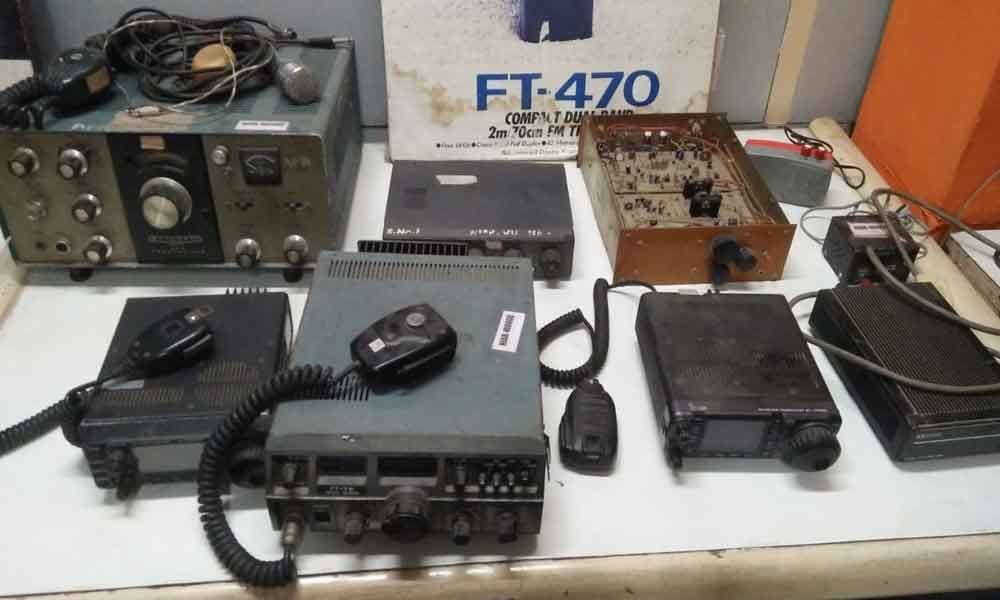Hyderabad Hams lend a hand during calamities

Three Radio Hams (Amateur radio operators call themselves ‘Radio Hams’) from the National Institute of Amateur Radio (NIAR) are now rendering their service in cyclone-hit Odisha.
Hyderabad: Three Radio Hams (Amateur radio operators call themselves 'Radio Hams') from the National Institute of Amateur Radio (NIAR) are now rendering their service in cyclone-hit Odisha.
Speaking to The Hans India, NIAR Director S Ram Mohan said that even in the past, several Radio Hams were involved in rescue operations during natural calamities in Nepal, Hud-Hud, Orissa super cyclone, Gujarat earthquake, Cedar cyclone to name a few.
Amateur radio is cost-effective solution either during natural calamities or preventive acts and when there is any emergency. NIAR conducts meet-and-greet programme on every Saturday evening at its office, where all the HAMs come and gather and share their experiences or know about the goings-on.
What is HAM or Amateur Radio?
HAM is said to be the combined initials of famous scientists 'Hertz, Armstrong, and Marconi.' HAM is also known as 'Home Amateur Mechanic.' It involves the use of radio frequency spectrum for purposes of non-commercial exchange of messages, wireless experimentation, self-training, private recreation, radio sport, contesting, and emergency communication.
The term amateur is used to specify a duly authorised person interested in radio electric practice with a purely personal aim and without pecuniary interest and to differentiate it from commercial broadcasting, public safety or professional two-way radio services.
Government of Andhra Pradesh and Telangana Amateur radio (HAM) operators provide effective second line of communications across the nation during major calamities like earth quakes, floods, cyclones and other climate disasters. There is no parallel to Amateur Radio in providing cost-effective solutions either during natural calamities or preventive acts or health disasters.
Uses of HAMs
HAMs offer cost-effective solutions for faster economic developments of far-reaching proportions. They provide cost-effective solutions during natural calamities. It is also an alternative national network on communications and IT for proper and coordinated use of skilled resource, trigger mechanism for developments in areas of Electronics, Computers, Communications, IT, Satellites, Space and Broadcasting.
It can provide cost-effective solutions for maintenance of technologies and alternate channels of communication that strengthens the activities of national security organisations. Several products and services in wireless communications including internet have their genesis in amateur radio Orbiting Satellites Carrying Amateur Radio (OSCAR) are satellites designed and developed by amateur radio operators.
Where in Hyderabad?
Amateur Radio or HAMs of India formed a club and established its head office in Hyderabad, which is National Institute of Amateur Radio (NIAR). NIAR was officially launched in 1983, June 21. NIAR is an NGO founded by S Suri. NIAR is established to spread the awareness of Amateur Radio activity amongst the people in India. NIAR has its offices, Library, Lab, Museum, Club Station, Conference Hall, Class Rooms, QSL Bureau, Guest House facilities along with staff quarters in its campus.
According to NIAR Director S Ram Mohan, NIAR conducts awareness and training programmes for the Amateur Station Operator License Examination regularly and also conducts seminars, meetings and workshops regularly at schools and colleges. Wireless Monitoring Station under Ministry of Communications, IT and DOT (Department of Telecommunication), Government of India, monitors the amateur radios or HAMs regularly and ensures that every HAM is following their guidelines. Children of 12 years and above can join the club.
Ram Mohan said for every two months there is a licence test by Wireless Monitoring Station, and classes for the same will be conducted a week before the test.
Jose Jacob, Assistant director, NIAR said he obtained his HAM licence in 1985 and since then working he has been operating as an HAM and participated various activities and also achieved a record in Limca Book by reception of 132 radio station of All India Radio. Jacob also provides training for the aspirants. Jacob is a specialist in Morse code.
Arun Kumar, who is a member of Mount Abu HAM club, was at NIAR for an experiment where one can connect transmitter to a computer. "With internet and the help of radio frequency we can contact any person across the globe using echolink. There are 5593 echolink stations in the world," he said.
Though HAMs are serving the nation in a unique way there is no financial assistance from the government from 1994. NIAR having its financial source by giving one of its two buildings located in its own campus for a private school for rent, and by fee from the new aspirants who are interested in learning HAM.
Amateur radio, also known as ham radio is a hobby enjoyed by over a million people worldwide. Amateur radio operators call themselves "radio hams" or simply "hams."
Amateur radio or HAM radio is a fun and exciting hobby including a vast array of activities like talking around the world without wires, also for emergency communications or public service communications.
Legacy communication modes like Morse code and Radio Teletype (RTTY), new communication modes like digital packet, Automatic Position Reporting System (APRS), Amateur radio satellites in space, Foxhunting (using "radio direction finding" techniques to find a hidden transmitter), Moon bounce (talking by bouncing radio waves off the moon).








